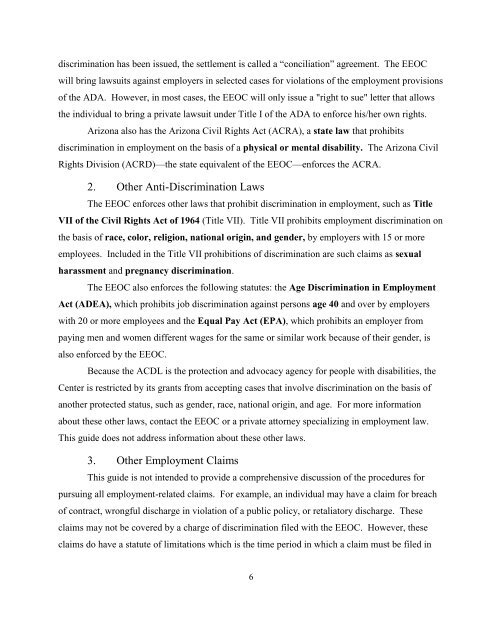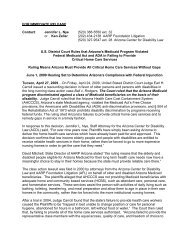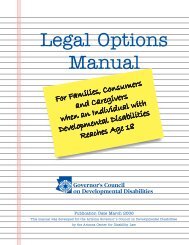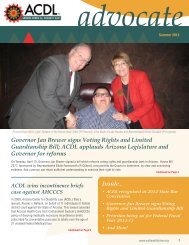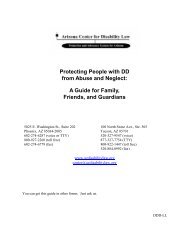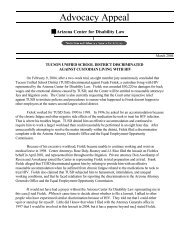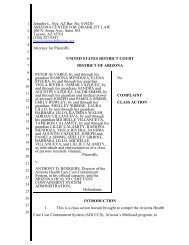How to Enforce Employment Rights Under the Americans with ...
How to Enforce Employment Rights Under the Americans with ...
How to Enforce Employment Rights Under the Americans with ...
You also want an ePaper? Increase the reach of your titles
YUMPU automatically turns print PDFs into web optimized ePapers that Google loves.
discrimination has been issued, <strong>the</strong> settlement is called a “conciliation” agreement. The EEOCwill bring lawsuits against employers in selected cases for violations of <strong>the</strong> employment provisionsof <strong>the</strong> ADA. <strong>How</strong>ever, in most cases, <strong>the</strong> EEOC will only issue a "right <strong>to</strong> sue" letter that allows<strong>the</strong> individual <strong>to</strong> bring a private lawsuit under Title I of <strong>the</strong> ADA <strong>to</strong> enforce his/her own rights.Arizona also has <strong>the</strong> Arizona Civil <strong>Rights</strong> Act (ACRA), a state law that prohibitsdiscrimination in employment on <strong>the</strong> basis of a physical or mental disability. The Arizona Civil<strong>Rights</strong> Division (ACRD)—<strong>the</strong> state equivalent of <strong>the</strong> EEOC—enforces <strong>the</strong> ACRA.2. O<strong>the</strong>r Anti-Discrimination LawsThe EEOC enforces o<strong>the</strong>r laws that prohibit discrimination in employment, such as TitleVII of <strong>the</strong> Civil <strong>Rights</strong> Act of 1964 (Title VII). Title VII prohibits employment discrimination on<strong>the</strong> basis of race, color, religion, national origin, and gender, by employers <strong>with</strong> 15 or moreemployees. Included in <strong>the</strong> Title VII prohibitions of discrimination are such claims as sexualharassment and pregnancy discrimination.The EEOC also enforces <strong>the</strong> following statutes: <strong>the</strong> Age Discrimination in <strong>Employment</strong>Act (ADEA), which prohibits job discrimination against persons age 40 and over by employers<strong>with</strong> 20 or more employees and <strong>the</strong> Equal Pay Act (EPA), which prohibits an employer frompaying men and women different wages for <strong>the</strong> same or similar work because of <strong>the</strong>ir gender, isalso enforced by <strong>the</strong> EEOC.Because <strong>the</strong> ACDL is <strong>the</strong> protection and advocacy agency for people <strong>with</strong> disabilities, <strong>the</strong>Center is restricted by its grants from accepting cases that involve discrimination on <strong>the</strong> basis ofano<strong>the</strong>r protected status, such as gender, race, national origin, and age. For more informationabout <strong>the</strong>se o<strong>the</strong>r laws, contact <strong>the</strong> EEOC or a private at<strong>to</strong>rney specializing in employment law.This guide does not address information about <strong>the</strong>se o<strong>the</strong>r laws.3. O<strong>the</strong>r <strong>Employment</strong> ClaimsThis guide is not intended <strong>to</strong> provide a comprehensive discussion of <strong>the</strong> procedures forpursuing all employment-related claims. For example, an individual may have a claim for breachof contract, wrongful discharge in violation of a public policy, or retalia<strong>to</strong>ry discharge. Theseclaims may not be covered by a charge of discrimination filed <strong>with</strong> <strong>the</strong> EEOC. <strong>How</strong>ever, <strong>the</strong>seclaims do have a statute of limitations which is <strong>the</strong> time period in which a claim must be filed in6


